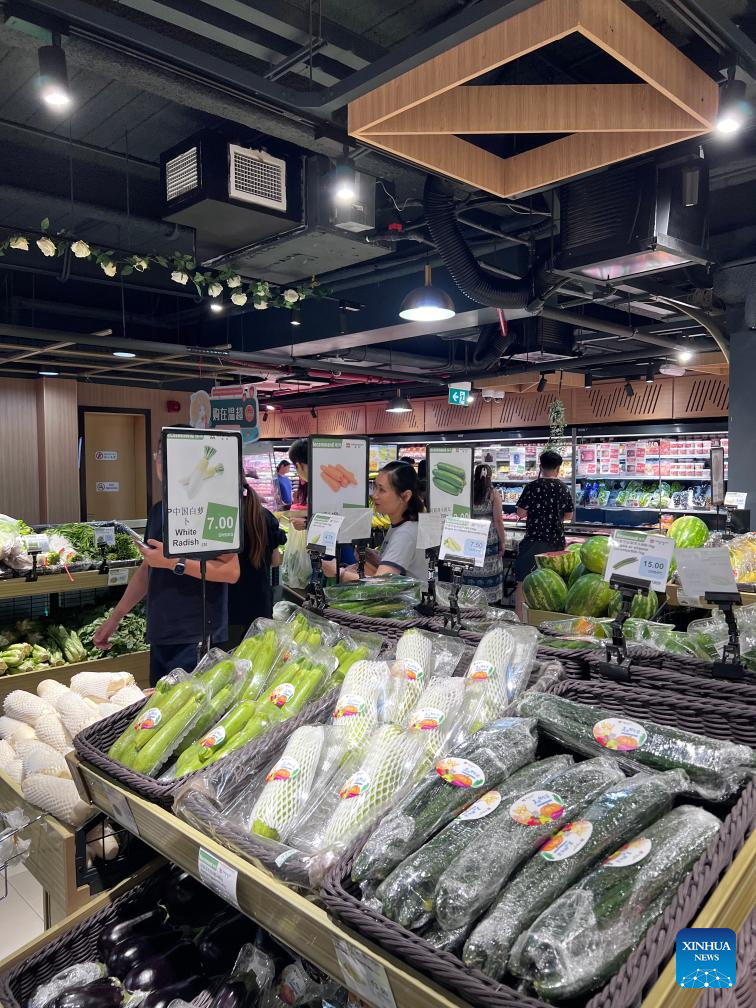
Vegetables from northwest China's Ningxia Hui Autonomous Region are for sale at a supermarket under the Wenchao Group in Dubai, United Arab Emirates (UAE), July 5, 2024.(Xinhua)
YINCHUAN, July 26 (Xinhua) -- In the inland Ningxia Hui Autonomous Region, cool-season vegetables, traditionally exported via road, have had a faster option since May this year with the air transport, which better preserves their freshness.
Almost every Thursday, approximately six to ten tonnes of such variety of vegetables are transported via passenger flight 3U3781. This flight departs from Yinchuan, the regional capital, and reaches Dubai, United Arab Emirates (UAE), after an eight-hour journey.
Since May, over 80 tonnes of vegetables have been air-freighted. The cool-season vegetables in the region benefit from abundant sunshine, a cool climate, clean air and water, and soil rich in organic matter.
"After harvesting, cooling, sorting and packaging, some 20 varieties of locally grown vegetables, such as Chinese broccoli and spinach, are exported to Dubai," said Wei Xinmin, head of Ningxia Xingyuntian Modern Agricultural Development Company.
After customs clearance in Dubai, the vegetables will be delivered to malls, supermarkets, hotels and restaurants.
UAE is an important export destination for China's agricultural products in the Middle East. According to Xiao Yonggang, an official with the regional commerce department responsible for foreign trade, the passenger flight service from Yinchuan to Dubai, launched in 2015, has significantly facilitated trade and economic exchanges between Ningxia and Middle Eastern countries, and this year, there has been a push to encourage vegetable exports via air transport.
"Dubai has a rich selection of meat and seafood, but fruits and vegetables are relatively scarce, which presents us with a business opportunity," Wei said, adding that even though logistics costs are nearly 15,000 yuan (about 2,105 U.S. dollars) per tonne, the company can still generate over 30 percent profit.
"We're also discussing opportunities in the vegetable export business with seven other Middle Eastern countries, including Saudi Arabia and Oman," Wei said.
WenChao Group, one of the largest Chinese supermarkets headquartered in Dubai, serves as a major retail outlet for Ningxia's cool-season vegetables in the city.
"Most of our vegetables are imported from China, with Ningxia's cool-season vegetables being the most popular," said Sun Jiansheng, head of the Wenchao Group. "Cool-season Ningxia vegetables are on my family's dining table every day. While my favorite is Chinese flowering cabbage, which is crisp in taste and can be either blanched or stir-fried."
"Our six stores sell about 50 tonnes of fresh produce daily, while we import less than 10 tonnes of cool-season vegetables from Ningxia through the flight every week," Sun said. "We expect an increasing supply and more flights to meet the growing demand for Ningxia produce."
In recent years, Ningxia has achieved year-round production and supply of vegetables through the use of greenhouses, arch sheds, and open fields, with 70 percent of its produce sold outside the region.
By 2025, the planting area for cool-climate vegetables in Ningxia is projected to reach 233,333 hectares, with a total output of over 7.5 million tonnes, according to the region's agricultural and rural affairs department. ■



